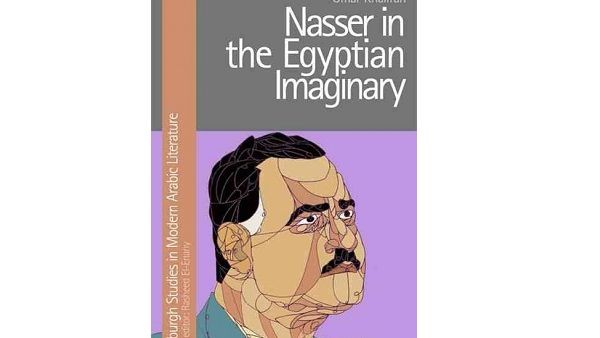Georgetown Professor explores legacy of Egypt's Gamal Abdel Nasser in new

Despite his death over four decades ago, the late president of Egypt, Gamal Abdel Nasser, remains an iconic figure in his country and the Arab world. A new book by a Georgetown University in Qatar (GU-Q) professor delves into how his memory has been kept alive and reimagined through art and literature.
Nasser in the Egyptian Imaginary by GU-Q assistant professor of Arabic literature and culture, Dr. Omar Khalifah, is an analysis of the many cultural representations of the president in novels, short stories, autobiographies, and films. The work was recently introduced to the community in Qatar through a book launch event at the University’s Education City campus.
In the book, Khalifah argues that representations of Nasser continue to have an active presence in everyday life and the discourse of the country. He also traces and contextualizes the timeline of the creation of Nasser’s image in this nationally-shared cultural imagination.
“Nasser’s place in Egyptian history came at a time of dynamic change culturally, politically, and militarily, whose legacy continues to be invoked in attempts to understand the past or to explain the present,” said Khalifah, who is an expert in Arabic literature and the intellectual history of modern Egypt.
“The reemergence of Nasser in literature and film demonstrates how the memory of Nasser is subject to plural interpretations,” Khalifah explained. “He has become a rhetorical device or figure of speech who connotes specific ideas or images when he is mentioned.”
Khalifah’s study makes a case for how literature and art provide a way for history to be interpreted and recorded. They can be seen as an alternative archive that questions, distorts, adds to, and even erases aspects of the official history of Nasser.
Published by Edinburgh University Press, this book contributes to the ongoing debate on Nasser and his relevance to modern Egyptians. It shows how, for many Egyptians, Nasser functions as a repository of cultural memory that isn’t always rooted in historical accuracy, and is often disconnected from the real historical figure he once was.
Khalifah received his MA and Ph.D. from the Department of Middle Eastern, South Asian, and African Studies at Columbia University, where the focus of his Ph.D. dissertation was on the representations of Egyptian president Nasser in Egyptian fiction and film.
In addition to modern Arabic literature, Khalifah’s research interests include textual and visual representations of memory, world literature, and cinema and nationalism in the Arab world. He has taught classes on the Arabic novel, freedom in modern Arabic literature, and Arab women's autobiography.
Background Information
Georgetown University in Qatar
Established in 1789 in Washington, DC, Georgetown University is one of the world’s leading academic and research institutions. Georgetown University in Qatar (GU-Q), founded in 2005 in partnership with Qatar Foundation, seeks to build upon the world-class reputation of the university through education, research, and service. Inspired by the university’s mission of promoting intellectual, ethical, and spiritual understanding, GU-Q aims to advance knowledge and provide students and the community with a holistic educational experience that produces global citizens committed to the service of humankind.
Located in Doha’s Education City, GU-Q offers the same internationally recognized Bachelor of Science in Foreign Service degree as Georgetown’s Capitol Campus in Washington, DC. This unique, interdisciplinary program prepares students to tackle the most important and pressing global issues by helping them develop critical thinking, analytic, and communication skills within an international context. GU-Q alumni work in leading local and international organizations across industries ranging from finance to energy, education, and media. The Qatar campus also serves as a residency and delivery location for the Executive Master’s in Emergency and Disaster Management along with the Executive Master’s in Leadership.






